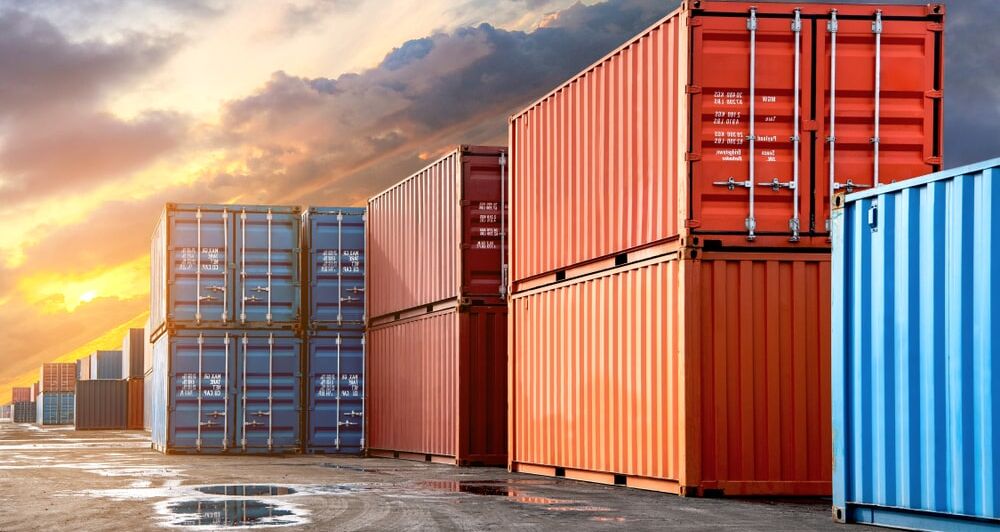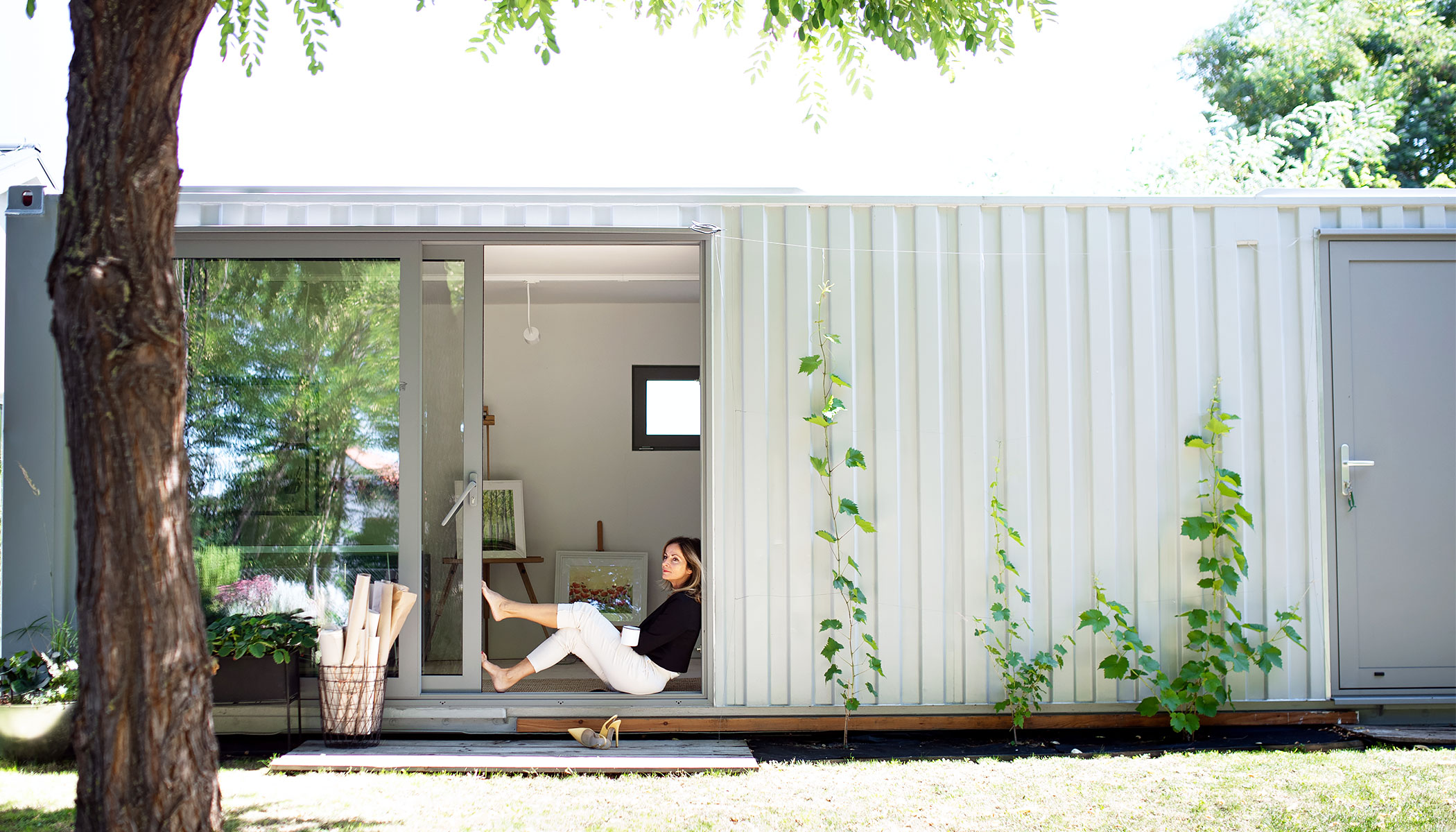Every little thing You Required to Know Concerning Shipping Containers and Their Practical Applications
Shipping containers have evolved from plain devices for transportation to versatile frameworks with various practical applications. Their durable layout and conventional sizing make them excellent for a series of usages past delivery. From ingenious real estate options to lasting farming, their versatility is significant. Yet, the possibilities do not end there. Exploring their various functions exposes shocking insights right into innovative solutions and modern-day obstacles. What other roles could these containers play in today's globe?
The Style and Framework of Shipping Containers

Inside, containers are created to optimize area, typically featuring wooden or steel flooring that can sustain significant weight. Ventilation systems may be included to prevent moisture accumulation, which is important for delicate freight. Furthermore, strengthened edges permit for easy handling by cranes and forklifts, helping with seamless loading and dumping. This thoughtful style and framework contribute to the containers' versatility across various shipping and storage space applications.
Benefits of Utilizing Shipping Containers
While lots of transportation techniques have their benefits, making use of delivery containers sticks out as a result of their unmatched flexibility and performance. Shipping containers use a standard size, making them easy to pile and move throughout various settings of transport, including ships, trains, and vehicles. This standardization minimizes packing and discharging times, thus increasing general performance.
Shipping containers are built from resilient products, supplying durable protection for items during transportation. They are weather-resistant and safe and secure, minimizing the danger of damages from ecological elements or burglary. Furthermore, the modular design of delivery containers enables simple customization, making it possible for organizations to adjust them for different functions, such as storage space or mobile offices.
Lastly, their transportability and cost-effectiveness make shipping containers an appealing option for companies seeking to streamline logistics and supply chain operations. These benefits contribute to the expanding popularity of delivery containers in various industries.
Imaginative Real Estate Solutions With Shipping Containers
Ingenious housing solutions have arised as an exciting application of delivery containers, leveraging their inherent toughness for domestic usage. These versatile frameworks use a sustainable alternative to standard building materials, typically at a fraction of the price. Designers and designers have actually changed containers right into stylish, useful homes, dealing with diverse lifestyles and preferences.

In addition, shipping containers are eco-friendly, promoting recycling and minimizing waste. Numerous jobs concentrate on energy performance, incorporating solar panels and green roofs. As urbanization boosts, these ingenious housing remedies offer a useful reaction to real estate lacks while cultivating an one-of-a-kind architectural aesthetic.
Shipping Containers in Retail and Pop-Up Shops
An expanding number of stores are transforming to shipping containers as a dynamic solution for pop-up stores and retail rooms. These flexible structures offer an affordable alternative to standard shops, permitting services to create distinct, attractive settings that attract consumers. Their modular design allows very easy transport and installment, making them excellent for seasonal or short-term retail locations.
Stores can tailor delivery containers to mirror their brand name identification, changing them right into aesthetically appealing shops that attract attention in crowded industries. The compact nature of containers likewise motivates efficient usage of room, permitting imaginative formats that maximize client circulation and engagement. Furthermore, shipping containers can be located in non-traditional places, such as vacant great deals or metropolitan parks, boosting access and foot website traffic.
As the retail landscape advances, shipping containers supply a innovative and flexible remedy that fulfills the needs of modern-day customers while boosting the buying experience.
Sustainable Farming Practices Utilizing Shipping Containers
Lasting farming methods progressively include shipping containers as ingenious remedies for agriculture - shipping container storage. These container farms use hydroponics to make the most of area and resource performance, offering an economical approach to food production. By transforming delivery containers right my company into agricultural hubs, farmers can attend to food protection and environmental concerns simultaneously
Container Farming Perks
While typical agriculture encounters difficulties such as land scarcity and climate adjustment, container farming provides a sensible option that takes full advantage of room and sources. This innovative approach enables year-round plant manufacturing in controlled atmospheres, minimizing dependence on climate condition. Container ranches use less water than conventional farming, advertising sustainability and preservation. They can be established in urban locations, bringing fresh fruit and vegetables closer to consumers and reducing transportation exhausts. Furthermore, the modular nature of shipping containers makes it possible for scalability, enabling farmers to readjust procedures based upon demand. Container farming also minimizes chemical usage by developing an enclosed ecological community, eventually boosting food safety. As urban populaces grow, container farming emerges as a functional service to meet the increasing need for local, sustainable food sources.
Hydroponics in Containers
Hydroponics, which allows plants to expand without soil by utilizing nutrient-rich water, prospers within the confines of delivery containers, making it a suitable technique for metropolitan agriculture. These containers produce a controlled environment that maximizes humidity, light, and temperature level, allowing year-round cultivation. With minimal space in urban areas, shipping containers provide a scalable remedy for growing fresh fruit and vegetables. Hydroponic systems within containers can include various strategies, such as nutrient film technique (NFT) and deep water society (DWC), which optimize yield while lessening water use. This innovative strategy not just boosts food protection yet additionally lowers the carbon impact linked with traditional farming approaches. Hydroponics in containers stands for a forward-thinking solution for sustainable metropolitan food production.
Cost-efficient Agriculture Solutions
As food manufacturing faces raising difficulties because of environment change and urbanization, delivering containers become a cost-efficient solution for agriculture. These versatile structures can be repurposed for numerous sustainable farming practices, such as hydroponics and vertical farming. By using controlled environments within containers, farmers can optimize growth cycles and decrease source intake, consisting of water and fertilizers. Additionally, shipping containers can be purposefully placed in city areas, minimizing transport prices and improving access to fresh fruit and vegetables. Their modular nature enables for scalability, making it possible for farmers to expand procedures as need expands. Repurposing containers adds to waste reduction, aligning with green farming efforts. On the whole, shipping containers present cutting-edge opportunities for efficient and sustainable food production.
Emergency Situation and Catastrophe Alleviation Applications of Shipping Containers

Organizations often make use of shipping containers to create mobile centers or field hospitals, making certain that healthcare gets to those in requirement. Additionally, they can be transformed right into command centers for coordinating rescue procedures, thus boosting organizational performance throughout dilemmas.
Containers can be changed to store important products such as apparel, water, these details and food, securing materials up until they are dispersed. Their mobility permits them to be quickly transported to various places, ensuring that help gets here where it is most quickly needed. Overall, shipping containers play a critical function in enhancing the effectiveness of disaster relief efforts worldwide.
Frequently Asked Inquiries
Just How Are Shipping Containers Transported From One Location to An Additional?
Shipping containers are transferred through vehicles, ships, and trains, using cranes for discharging and filling. This multi-modal transport system makes certain efficient motion across land and sea, linking worldwide supply chains and helping with international profession.
What Is the Average Lifespan of a Shipping Container?
The average life expectancy of a shipping container normally varies from 10 to 25 years, relying on upkeep, usage, and ecological variables. Appropriate care can prolong their functionality, while disregard may bring about wear and tear and damage.
Can Shipping Containers Be Modified for Different Uses?
Yes, shipping containers can be customized for numerous uses. They offer as homes, workplaces, pop-up stores, and storage units. Their versatility enables innovative adaptations, making them suitable for a large range of applications.
Are Shipping Containers Eco-friendly?
Shipping containers can be eco friendly, as they promote repurposing and reusing. Their toughness minimizes waste, while their use in different housing and organizations minimizes the need for new products, adding to lasting practices.
How Do I Choose the Right Size Shipping Container?
To select the right size delivery container, one should evaluate storage requirements, consider the designated usage, and assess area schedule - Shipping Containers. Typical sizes consist of 20-foot and 40-foot containers, each serving various storage and transport requirements properly
Ingenious housing services have emerged as an interesting application of shipping containers, leveraging their inherent strengths for residential usage. The adaptability of shipping containers permits for innovative designs, from single-unit homes look at this site to complex multi-container setups. Lasting farming practices increasingly include shipping containers as cutting-edge services for farming. In addition, the modular nature of delivery containers allows scalability, enabling farmers to readjust operations based on need. Hydroponics, which allows plants to grow without dirt by making use of nutrient-rich water, grows within the boundaries of shipping containers, making it a suitable approach for urban agriculture.